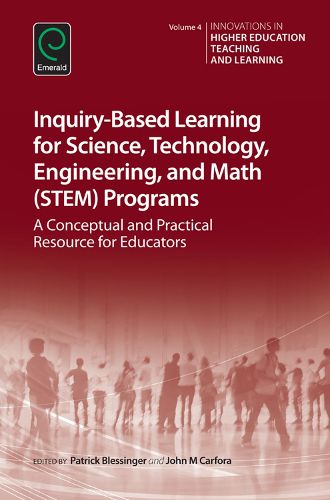Readings Newsletter
Become a Readings Member to make your shopping experience even easier.
Sign in or sign up for free!
You’re not far away from qualifying for FREE standard shipping within Australia
You’ve qualified for FREE standard shipping within Australia
The cart is loading…






Inquiry-based learning (IBL) is a learner-centered active learning environment where deep learning is cultivated by a process of inquiry owned by the learner. It has roots in a constructivist educational philosophy and is oriented around three components: 1) exploration and discovery (e.g. problem-based learning, open meaning-making), 2) authentic investigations using contextualized learning (e.g. field studies, case studies), and 3) research-based approach (e.g. research-based learning, project-based learning). IBL begins with an authentic and contextualized problem scenario where learners identify their own issues and questions and the teacher serves as guide in the learning process. It encourages self-regulated learning because the responsibility is on learners to determine issues and research questions and the resources they need to address them. This way learning occurs across all learning domains. This volume covers many issues and concepts of how IBL can be applied to STEM programs. It serves as a conceptual and practical resource and guide for educators, offering practical examples of IBL in action and diverse strategies on how to implement IBL in different contexts.
$9.00 standard shipping within Australia
FREE standard shipping within Australia for orders over $100.00
Express & International shipping calculated at checkout
Inquiry-based learning (IBL) is a learner-centered active learning environment where deep learning is cultivated by a process of inquiry owned by the learner. It has roots in a constructivist educational philosophy and is oriented around three components: 1) exploration and discovery (e.g. problem-based learning, open meaning-making), 2) authentic investigations using contextualized learning (e.g. field studies, case studies), and 3) research-based approach (e.g. research-based learning, project-based learning). IBL begins with an authentic and contextualized problem scenario where learners identify their own issues and questions and the teacher serves as guide in the learning process. It encourages self-regulated learning because the responsibility is on learners to determine issues and research questions and the resources they need to address them. This way learning occurs across all learning domains. This volume covers many issues and concepts of how IBL can be applied to STEM programs. It serves as a conceptual and practical resource and guide for educators, offering practical examples of IBL in action and diverse strategies on how to implement IBL in different contexts.